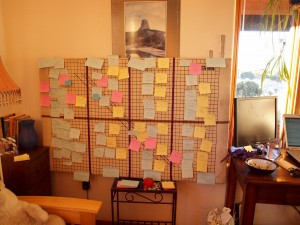 I’m over at Word Whores today, talking about writing when you’re sick.
I’m over at Word Whores today, talking about writing when you’re sick.
Category: Blog
Another Reason Writing More Books is Better
 One of my Twitter friends mentioned how worked up she is about her new release. She asked if authors get used to it and how long the excitement lasts after release for more-established authors. A week? Two?
One of my Twitter friends mentioned how worked up she is about her new release. She asked if authors get used to it and how long the excitement lasts after release for more-established authors. A week? Two?
I replied to her and we had an interesting conversation about it. Then, yesterday, I saw on Goodreads that – overnight – over a hundred people had added Platinum to their “To Read” lists. This is a really fun thing to wake up and see. I Tweeted about it, wondering why the sudden surge. Several people suggested possibilities – very likely that it was cited on some high-traffic list – but I haven’t figured it out yet.
Then I went back to work on the Phantom book.
And this, I think, it what makes all the difference between authors of one books and authors of multiple books. The more books you have out there, the more books you’re writing, the less ability you have to obsess over one.
For example, with Goodreads, when I log on – and it’s one of my default pages for when I open Firefox – I have a sidebar that shows my stuff. At the top is my Author Dashboard, which shows my most recent publication. That’s Platinum right now, which is why I immediately notice the numbers. It shows me the cover, how many people have added it, how many rankings and how many reviews. To see more detail than that, or my other books, I have to click and go to the page. I rarely do this, because I think it’s putting my attention on the wrong things. (The main reason I have Goodreads on default is to remind me to update my status on whatever I’m currently reading – also in the sidebar.)
Now that Platinum pops up on that home page, I don’t see the Rogue’s Pawn ranking and review numbers anymore. It makes me move on, regardless of how well a book is performing.
The other thing I notice, now that I have seven fiction publications out there, is that different readers like different stories. We all go into this *knowing* that, but it’s difficult to keep in mind when a reader doesn’t like YOUR book. The perspective gets infinitely better when they don’t like this one, but do like that one.
So, all those times industry folks say the best thing you can do is write more stories? This is yet another reason why.
Why It’s Important to Separate Validation from Creation
 I’m sure you guys knew this already – I mean, what else do you have to keep track of?? – but Platinum is coming out February 25.
I’m sure you guys knew this already – I mean, what else do you have to keep track of?? – but Platinum is coming out February 25.
It’s up on Net Galley now, if you’re a reviewer type. So, because it is up for reviewers, I’m starting to get feedback on it – which is always fun. People seem to be enjoying the story in the ways I hoped they would. But it’s kind of difficult for me to get as totally revved as they are. It’s several stories ago for me now, so it’s kind of old news.
Which is a weird place to be.
It makes me think of this interview I saw with Barbara McClintock when she won the Nobel Prize for Physiology or Medicine in 1983. She was 81 when she received the prize and I remember the interviewer was someone much younger and full of enthusiasm. The interviewer asked if Barbara wasn’t just SO EXCITED about the award. For Jumping Genes! (Transposable elements in DNA) Everyone was just *so* interested in this amazing discovery!
And Barbara looked at her kind of funny and said something along the lines of, “Well, it’s always nice to be recognized, but I did that work forty years ago and I was excited about it then. What I’m working on right now is what’s most interesting to me.”
Which deflated the interviewer a bit.
Interestingly, she had stopped publishing her work on the transposable elements in DNA back in 1953, because she encountered so much skepticism about it. I could really see how being awarded an unshared Nobel prize (the only woman to ever receive an unshared Nobel prize in that category) thirty years later might be a little…anti-climactic.
Not that the incipient release of Platinum compares in any way to the magnitude of McClintock’s discovery. I just think it’s important to remember that the joy of creation – or discovery – remains forever a separate thing from other people’s validation of it. Usually it comes much later and often after they gave you all kinds of shit for doing it in the first place.
Then, later, when they tell you how great this thing you’ve done is, they never remember that they were skeptical, just that they love it now.
Which is okay.
After all – enthusiasm is always to be treasured.
How Reading as a Writer Is Different
 I’m over at Word Whores today, talking about how I read differently now that I’m a writer – to my regret.
I’m over at Word Whores today, talking about how I read differently now that I’m a writer – to my regret.
Why Everybody Advises Newbie Writers to Be Persistent
 This is our master bathroom – and Jackson waiting for a mouse.
This is our master bathroom – and Jackson waiting for a mouse.
All night and all day.
See, the bathroom cabinet there has a space in that overhang at the bottom. I can just fit about half of my hand in there, before the pinch stops me. I know this because I’ve tried. Just a few days after we moved in, I dropped the lid to a little sparkly beaded box from India that I store my belly-button jewelry in. The lid hit the floor, bounced exactly right (what are the odds?) and went up and into that space under the cabinet.
Gone forever, unless I want to tear out the cabinet.
See, the inside of the cabinet is all solid-state – even if you pull out the drawers, etc., there’s no access to the space beneath. That bottom panel is firmly affixed. Short of using a crowbar, I’m not budging it.
This also makes it a perfect escape hatch for mice being hunted by the cats.
How to Play Marco Polo Day
 Did you know that today is Marco Polo Day??
Did you know that today is Marco Polo Day??
Oh, come on. Yes, you did. You celebrate every year, don’t you?
So, fellow author Voirey Linger came up with a little game for today. Here’s the repost from her site:
January 9, 1324, Marco Polo slipped the bonds of this world and drifted into history. He explored Asia, established trade routes with China, and launched a summer game loved by millions.
To celebrate his life and his game, we are launching Marco Polo day on Twitter. The rules are simple. Follow the players listed below from your Twitter account. When one of them yells MARCO you hit reply and @ them with POLO. First to respond will win an ebook. If you’re not following, you can’t win.
You can see a list of participating authors here.
As for me, three times today I will yell out MARCO! on Twitter. First to reply with POLO gets a digital copy of any of my books – including PLATINUM, which isn’t on sale until February 25.
Sounds fun, yes?
Let’s Play!
I Don’t F**cking Care If You Like It
 If you look closely, that thermometer reads 9.3 degrees F. Brr! But then the sun rose high enough, it warmed up, and all the fairy frost disappeared.
If you look closely, that thermometer reads 9.3 degrees F. Brr! But then the sun rose high enough, it warmed up, and all the fairy frost disappeared.
Last Friday I posted about something I learned about writing from reading Tina Fey’s Bossypants. I extracted so many great nuggets of wisdom from that book, I just have to share (at least) one more.
Amy Poehler was new to SNL and we were all crowded into the seventeenth-floor writers’ room, waiting for the Wednesday read-through to start. There were always a lot of noisy “comedy bits” going on in that room. Amy was in the middle of some such nonsense with Seth Meyers across the table, and she did something vulgar as a joke. I can’t remember what it was exactly, except it was dirty and loud and “unladylike.”
Jimmy Fallon, who was arguably the star of the show at the time, turned to her and in a faux-squeamish voice said, “Stop that! It’s not cute! I don’t like it.”
Amy dropped what she was doing, went black in the eyes for a second, and wheeled around on him. “I don’t fucking care if you like it.” Jimmy was visibly startled. Amy went right back to enjoying her ridiculous bit. (I should make it clear that Jimmy and Amy are very good friends and there was never any real beef between them. Insert penis joke here.)
With that exchange, a cosmic shift took place. Amy made it clear that she wasn’t there to be cute. She wasn’t there to play wives and girlfriends in the boys’ scenes. She was there to do what she wanted to do and she did not fucking care if you like it.
I was so happy. Weirdly, I remember thinking, “My friend is here! My friend is here!” Even though things had been going great for me at the show, with Amy there, I felt less alone.
(Fey, Tina (2011-04-05). Bossypants (Kindle Locations 1436-1441). Reagan Arthur Books. Kindle Edition.)
That chapter is subtitled “One in a series of love letters to Amy Poehler.” Now, I’ve long loved Amy Poehler’s comedy, too, but this made me adore her just that much more.
I think this makes a good mantra for writers. I’m going to take an extra step and say particularly for female writers. I know the guys suffer much of the same stuff we do – the critics, the rejections, the uncertainty. But I really do believe that, as females, we are strongly programmed by society to be likable. Women who are judged unlikable (Hillary Clinton, for example) are excoriated for it – a judgment that overshadows their other accomplishments. We learn very early that we are meant to be pretty, polite and affectionate. We might enjoy being those things, but feeling the pressure to be that – with little room for anything else – can really get to you over time.
Especially when you’re an artist. It’s hard (maybe impossible?) to make good art when you’re worried about people liking it. You might have to think about that stuff when it comes to marketing, but there’s no place for it when you’re creating. And, I think, it’s really hard for women to get away from that consideration.
So, this is a liberating thing.
Say it with me, kids.
I don’t fucking care if you like it!
I knew you could.
How I Clean Up My MSS Before Sending
 I’m over at Word Whores this first Sunday of the new year, giving insight into my last-thing checklist to polish a manuscript before I send it in.
I’m over at Word Whores this first Sunday of the new year, giving insight into my last-thing checklist to polish a manuscript before I send it in.
How (Not) to Write a Mainstream Success
 We get these freezing fogs in Santa Fe that turn the desert into a fairyland of ice crystals. Just extraordinary to see.
We get these freezing fogs in Santa Fe that turn the desert into a fairyland of ice crystals. Just extraordinary to see.
As every reader delights in, I received several books for Christmas – along with gift cards for even More Books. Two that I specifically asked for (via my wishlist) were Tina Fey’s Bossypants and Gillian Flynn’s Sharp Objects. On Christmas Eve, my aunt, who wasn’t with us, IM’d my mom to ask if I’d received the Kindle book she’d sent. My mom said she didn’t know, but that she’d gotten me a paper copy of Sharp Objects for my stocking, that my aunt had better not have gotten the same book and what was it? My aunt said “Bossypants!” and my mom was all offended that her sister called her that. My mom didn’t figure out until Christmas morning that this was not a sisterly insult, accurate though it may be, but the title of the Kindle book, which I did, indeed, receive.
Hysterical, I think.
That said, I really enjoyed Bossypants. I admire Tina Fey so much. In fact, I should put her on that list of people interviewers always ask for about which living people I’d like to have dinner with. Right now I’m picturing Tina Fey, Amanda Palmer and Neil Gaiman at my table.
Too bad they’ll make me look like a blithering idiot.
At any rate, Tina Fey is a sharp, witty and insightful writer. They book is more a collection of essays that all bring insight into how she developed the career she has today. I think people in any field, male or female would be interested, but she has so much to offer females in creative professions – regardless of the medium – that I’d almost call it a must read.
I plan to be quoting various tidbits from it in the future.
But the part that really stood out for me at this moment, that I typed into messenger for one of my writing buddies as soon as I got home, was about her show 30 Rock.
Now, I love 30 Rock. You all know I don’t watch much TV, but I’ve watched as much of 30 Rock as I can (via Netflix). Like Tina, it’s funny, sharp, insightful and full of sly jokes. I would call it one of the best shows on TV, except that I’m so not an arbiter of such things. At any rate, she said this about it:
We weren’t trying to make a low-rated critical darling that snarled in the face of conventionality. We were trying to make Home Improvement and we did it wrong. You know those scientists who were developing a blood-pressure medicine and they accidentally invented Viagra? We were trying to make Viagra and we ended up with blood-pressure medicine. No matter how many times we tried to course-correct the show to make it more accessible – slow the dialogue down, tell fewer stories per episode, stop putting people in blackface – the show would end up careening off the rails again. In my limited experience, shows are like children. You can teach them manners and dress them in little sailor suits, but in the end, they’re going to be who they’re going to be.
And wow – did that hit home for me, as a writer.
It did for my writing buddy too. She and I even had a mission going for a while called “Project Mainstream,” where we each tried to develop a really mainstream, conventional idea for a book, that would be, well, Home Improvement. Project Mainstream did not go well. She’s doing better than I am, however. But we realized several things about ourselves in this effort.
1. She and I make the worst possible coaches for each other in this. We both take stories careening off the rails. Every. Damn. Time.
2. I’m miserable at trying to do this, because every time she’d point out that some plot element wasn’t mainstream, I’d start snarling in the face of conventionality.
3. In our heart of hearts, neither of us *really* wants this. We couldn’t bear dressing our kids in little sailor suits and we don’t fundamentally give a flip about manners. Before long, we were stripped down with them in the mud puddle, making castles.
When I sent her this snippet from Bossypants, her immediate response was, “But isn’t 30 Rock a really successful show?” Which is an interesting point, too. I would certainly have said so. In the world of television though, the ratings barely get them by. She says they had 5 million viewers in the first season. At its height, Friends was getting 25 million viewers per episode.
This is a whole ‘nother kettle of fish from the writing world, no doubt. For contrast, Twilight has sold 100 million copies, all told – equivalent to four episodes of Friends. Hunger Games had an initial print run of 200,000 copies and has sold in the neighborhood of 800,000 copies now. In ten years, Neil Gaiman’s American Gods has sold 1 million copies in 22 languages worldwide.
See what I mean?
I’ve heard the unofficial number of 15,000 copies sold to be considered a successful book in NYC.
It all calls up the question of what we consider to be a successful effort. Tina Fey set out to make Home Improvement. With Project Mainstream, my writing buddy and I were shooting for something similar. Maybe not Twilight, but Hunger Games would be nice. Hell, we’d be delighted with much less.
But in our heart of hearts? It’s castles in the mud that make us the happiest.
How Breaking Old Habits Brings New Excitement

 I reorganized my office over the weekend.
I reorganized my office over the weekend.
I know, I know – this is hardly earth-shattering news. But you all know how it is. I spend in the neighborhood of half my day in this room, between my day job and the writing career. To rework it after several years has a profound effect on my life. Plus, I like the change much better than I’d expected to.
See, the day after Christmas, I went online and bought myself a treadmill desk. All of you out there looking for those great articles about the DIY treadmill desk or the cheapie alternative? You will not find it here. Yes, I looked at all of those articles and people gave me great advice. But, in the end, I wanted a long-term solution that I could live with for my roughly half a day that I’d spend with it. I’ll do a post on my solution when it all arrives (not for several weeks), but the short version is that I’m getting a hydraulic desk that I can raise and lower, so I can either sit or stand or walk while working at it.
The new desk is significantly bigger than my current desk, so I knew I’d need to rearrange. Especially if I wanted to keep my window view, which was a high priority for me. Since I couldn’t have my new treadmill desk yet, I could displace that excitement into a bit of New Year’s new office energy.
Basically all I had to do was flip the furniture from one side to the other. Here’s how it looked before:
 My story board was propped on a little table to the left of my desk.
My story board was propped on a little table to the left of my desk.
 And – well, it turns out I don’t have a good picture of the other side, but all my computer/day-job related stuff (printers, scanners, files) were to the right. When we moved in, I set it up that way because there’s a handy-dandy power strip along that west wall. It seemed logical to put all the plug-in stuff next to it. But the problem with that kind of thing is the power strip location drove everything else. Which turns out to have been not the best choice.
And – well, it turns out I don’t have a good picture of the other side, but all my computer/day-job related stuff (printers, scanners, files) were to the right. When we moved in, I set it up that way because there’s a handy-dandy power strip along that west wall. It seemed logical to put all the plug-in stuff next to it. But the problem with that kind of thing is the power strip location drove everything else. Which turns out to have been not the best choice.
Part of this comes from changes in technology, but all that STUFF is now to the left of my desk, which you can see in the very top pic. The equipment is all smaller, combined, with fewer cords. I also like the serendipity of how the painting of the view out a window to the ocean kind of carries over from my real window with the desert view.
Now the corner is much more all about my writing face. I love how my story board is now right there – and I can swivel in my chair to see it and contemplate. (It’s set up for the Phantom e-serial now, so if the act structure looks different now – for those alert blog readers who notice such things – that’s why.)
I don’t know if it shows in the pictures, but the difference in the feel of the space, the feng shui, if you will, is startling. More, I find the change has stimulated me. See, habits can be good things. The terrific thing about habits is they carry us through tasks that don’t require thinking. Like learning to drive. At first it felt like ten-thousand things to think about – clutches, accelerators, brakes, steering wheels, turn signals, wipers, lights, fifteen-million other drivers in a mad whirl – but over time that becomes automatic. We can drive our entire commute without really thinking about it, which lets us pay attention to things like audiobooks. But this energy-saving feature of our natures comes with a cost – it’s easy to miss stuff this way. Who among us has not been driving down the highway and suddenly realized half an hour has gone by that we don’t remember? What did we miss?
Deliberately breaking a habit can bring new awareness and stimulation. Just being in my reversed space makes me have to think about where the phone is, where something is now kept. I feel excited and ready for new things.
Plus? Treadmill desk!